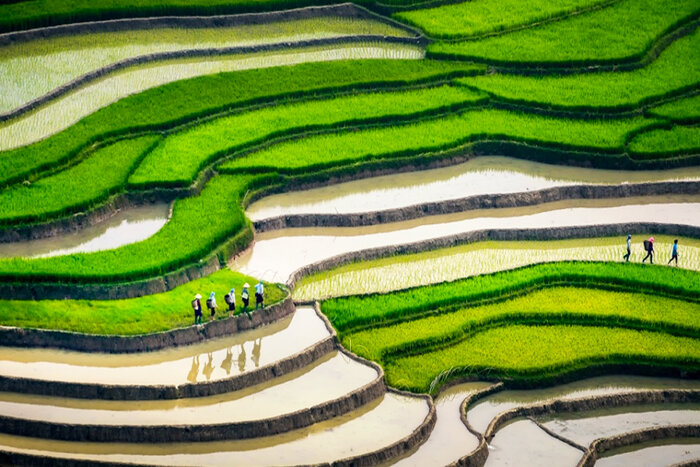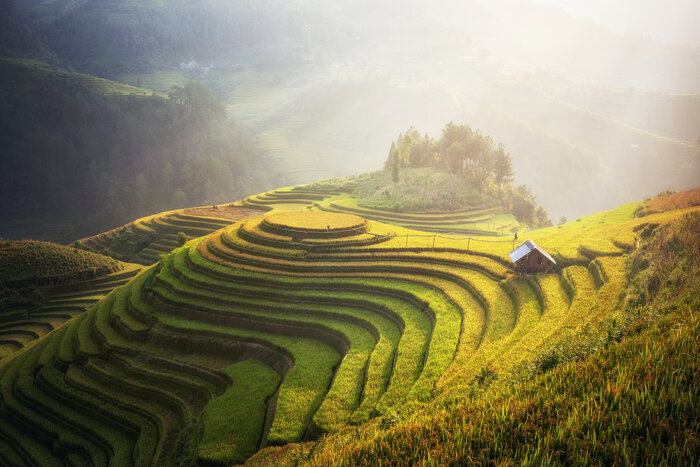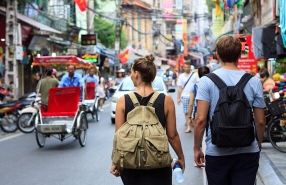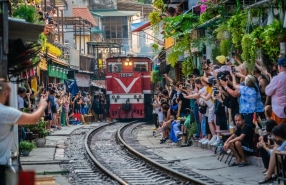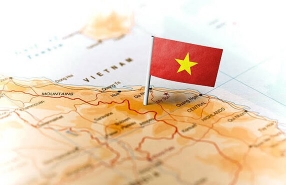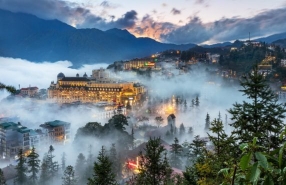
Situated in the Northwest mountainous region, Mu Cang Chai is a district within Yen Bai province, renowned for its distinctive landscapes and designated as a national scenic relic. Revered by enthusiasts of Vietnam customized tours, Mu Cang Chai captivates with its remarkable features, including towering mountains, rich cultural heritage, and breathtaking terraced fields. For those eager to explore this enchanting destination, the question often arises: When is the best time to visit Mu Cang Chai? Join Autour Asia as we unravel the answer in the following article.
1. Overview of Mu Cang Chai
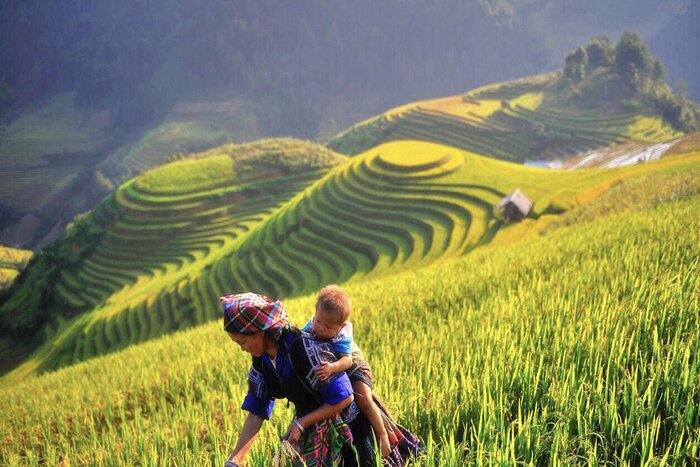
Nestled in the picturesque northwest region of Vietnam, Mu Cang Chai (Yen Bai) stands as a testament to nature's beauty and cultural richness. With its stunning terraced rice fields, shaped by the skilled hands of the local Hmong ethnic minority, Mu Cang Chai is a destination that beckons travelers year-round. However, understanding the nuances of Mu Cang Chai weather can enhance your experience, ensuring you witness its splendors at their peak.
Mu Cang Chai has four distinct seasons with completely different shades, but each season has its beauty.
a. Spring (March to May)
As the land awakens from its winter slumber, Mu Cang Chai adorns itself with vibrant hues of green. Spring brings a refreshing vitality to the terraced fields, with the rice paddies reflecting the sunlight like mirrors. Mu Cang Chai weather is mild, making it an excellent time for trekking and exploring the local culture.
b. Summer (June to August)
Mu Cang Chai experiences its warmest temperatures during the summer months. The terraced fields are lush with greenery, creating a picturesque landscape. This season is ideal for those who prefer milder temperatures, and you can witness the farmers tending to their crops, adding an authentic touch to your visit.
c. Autumn (September to November)
Autumn casts a magical spell over Mu Cang Chai as the rice fields turn golden, creating a mesmerizing sight. Mu Cang Chai weather remains pleasant, and the harvest season provides a unique opportunity to witness the local traditions of rice cultivation and celebrate the abundance of nature.
d. Winter (December to February)
Winter brings a different charm to Mu Cang Chai, with cooler temperatures and misty mornings. While the terraced fields are not in their full glory, the surrounding landscapes, wrapped in a serene winter blanket, offer a tranquil escape. This period is perfect for those seeking a quieter, more contemplative experience.
2. The weather of Mu Cang Chai
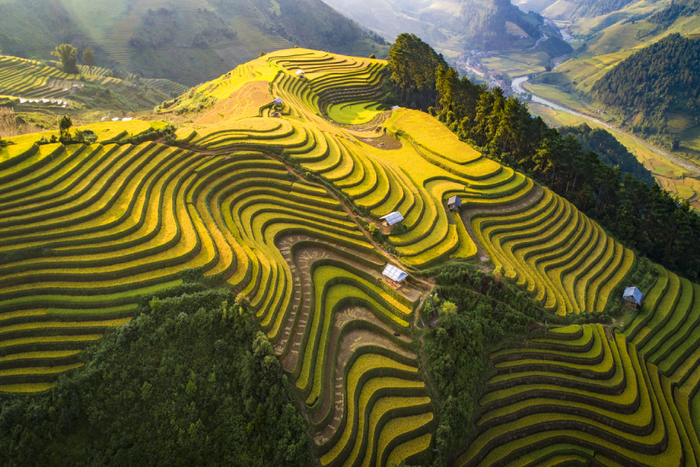
a. Dry season
Mu Cang Chai (Yen Bai) has two distinct seasons, characterized by temperature and rainfall patterns: the cold season, which is dry, and the hot season, which is rainy. The dry season spans from November to March in Mu Cang Chai, with an average temperature below 20°C, and some areas even registering temperatures below 0°C. Drizzle is common in the concluding months of the cold season.
b. Rainy season
From April to October, Mu Cang Chai witnesses the onset of the rainy season, with average daily highs surpassing 25°C and occasional peaks reaching 39°C. This season brings not only rain but also whirlwinds and flash floods, particularly occurring during the hot season. Despite Mu Cang Chai experiencing considerable rainfall, it is distributed unevenly throughout the year, totaling between 1800 and 2000 mm annually. The months from May to September bear the brunt of the rainfall, posing challenges to crops and roads. If you plan to visit Mu Cang Chai (Yen Bai) during the rainy season, it is advisable to closely monitor the weather conditions.
3. When is the best time to visit Mu Cang Chai?
a. Water pouring season (from May to June)
Late May to June is the best time to visit Mu Cang Chai, signaling the onset of the watering season. During this phase, Mu Cang Chai's rice fields are immersed in water, priming them for the planting season. The fields undergo a captivating transformation into a vivid sea of green as newly planted rice sprouts emerge. The region buzzes with the sounds of farmers caring for their crops, creating a scenic backdrop for visitors to capture remarkable photos.
The watering season in Mu Cang Chai is a time of lively activity and anticipation, drawing locals and tourists to witness the rice fields evolving into luxuriant green expanses. Visitors can engage in various activities, including hiking along the rice terraces, exploring local villages to discover traditional farming practices, or simply relaxing while enjoying breathtaking views.
b. Green rice season (August)
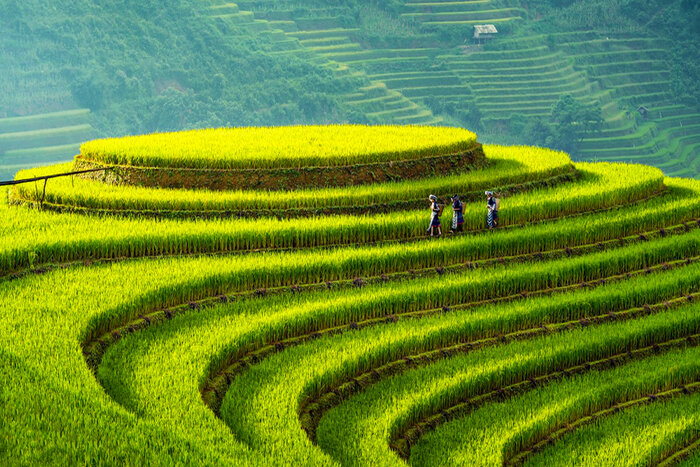
When is the best time to visit Mu Cang Chai? Mu Cang Chai's summer coincides with the nation's hot season, showcasing captivating beauty amid a pleasantly warm climate. From July to August, the mid-season crop transforms the terraced fields, adorning them with the characteristic green hue of young rice. The lush greenery of growing rice plants is a delightful sight. In this season, Mu Cang Chai reveals expansive mountains covered in green rice fields, creating an exceptionally tranquil and verdant environment.
c. Golden rice season (around mid-September to mid-October)
Mu Cang Chai attracts numerous tourists, especially during the annual harvesting season from September to October. This period witnesses bustling activity in Mu Cang Chai's rice fields, with farmers diligently gathering the matured rice crops. The fields undergo a breathtaking transformation into a golden landscape, creating a scenic setting for visitors to capture remarkable photos. The air is infused with the fragrance of freshly harvested rice, enhancing the overall sensory experience.
Visitors exploring Mu Cang Chai during the harvesting season have the opportunity to engage in diverse activities. These include learning about the locals' traditional farming methods, actively participating in the harvest, and even trying their hand at rice harvesting. The locals are enthusiastic about sharing their culture and often organize traditional festivals and events during this time. The harvesting season stands out as one of the best time to visit Mu Cang Chai, offering a unique glimpse into the rural way of life in the region.
4. Some useful tips about Mu Cang Chai weather by month for your trip
Here are some general tips regarding the weather in Mu Cang Chai to help you plan and make the most of your trip:
Research the information in advance and choose the best time to start your trip to visit Mu Cang Chai.
Bring sunscreen, a hat, and sunglasses to protect yourself from the sun's rays, especially during outdoor activities.
Stay informed about the weather forecast before and during your trip.
Wear sturdy and comfortable footwear, especially during the harvesting season when the terrain can be uneven.
Carry a reusable water bottle and stay hydrated, especially if you're engaging in physical activities.
Irrespective of the season, Mu Cang Chai's allure lies in its natural splendor and cultural richness, making it an essential destination for those seeking to discover the rural charm of northern Vietnam. The
best time to visit Mu Cang Chai is either during the harvest season, typically spanning from September to October, or the watering season from May to June. Autour Asia aspires that this information proves beneficial for ensuring an enjoyable trip to Mu Cang Chai. To ensure a seamless and unforgettable travel experience,
CONTACT AUTOUR ASIA to receive the best advice, we are your trusted partner on every trip.



